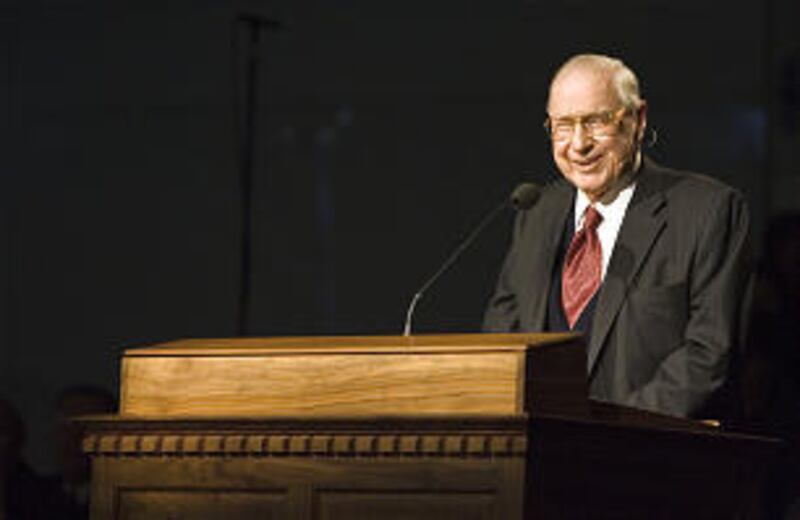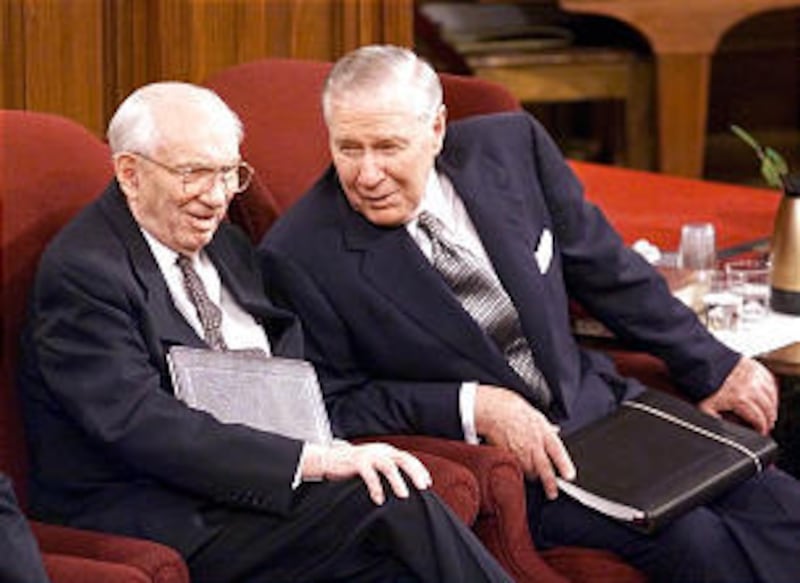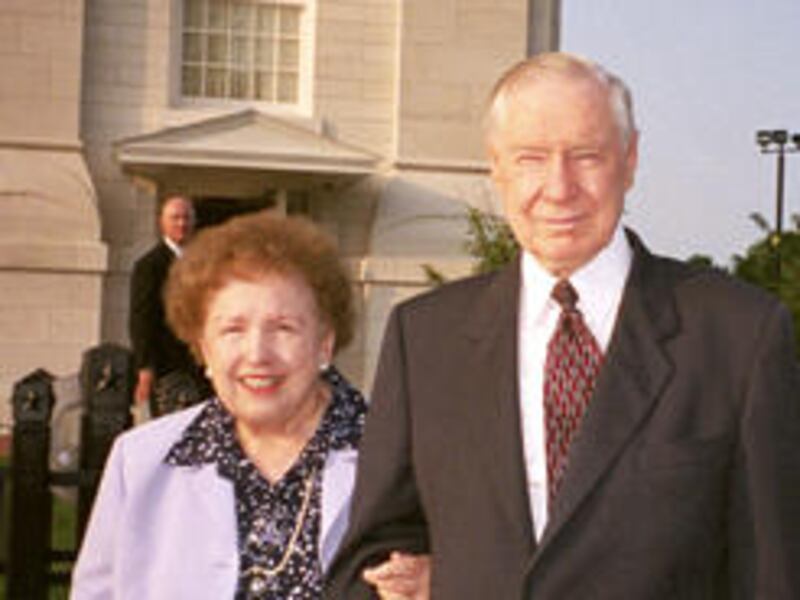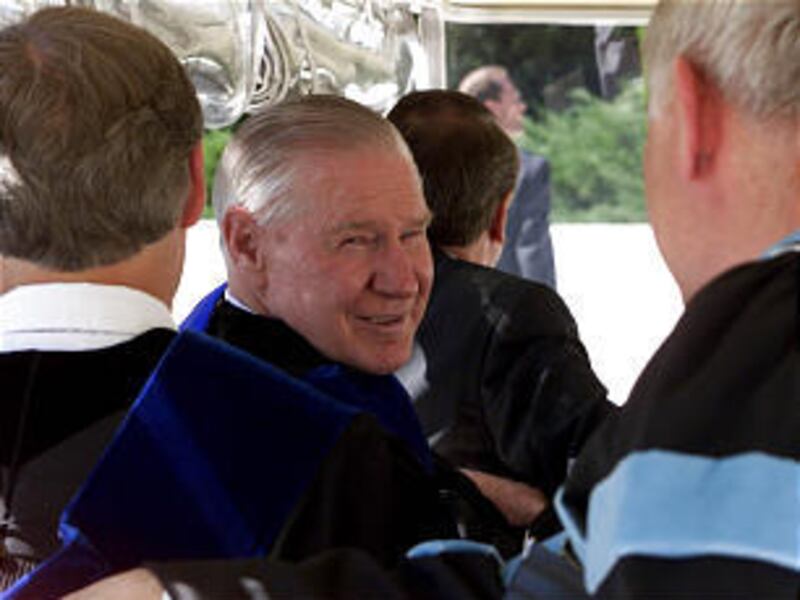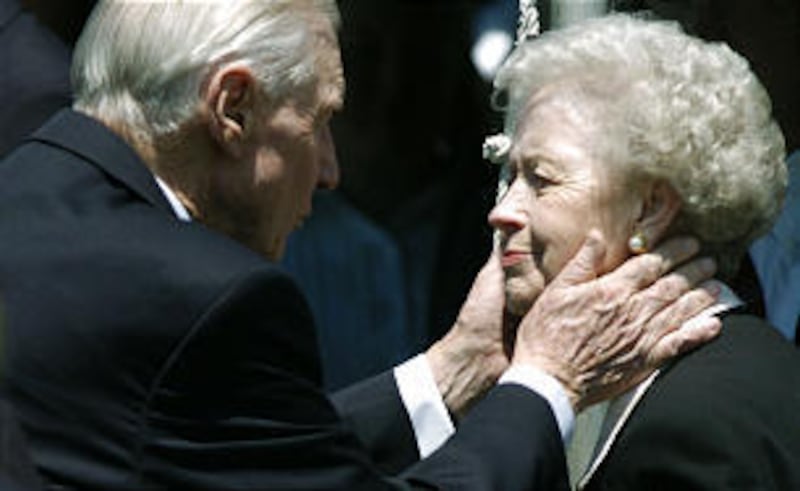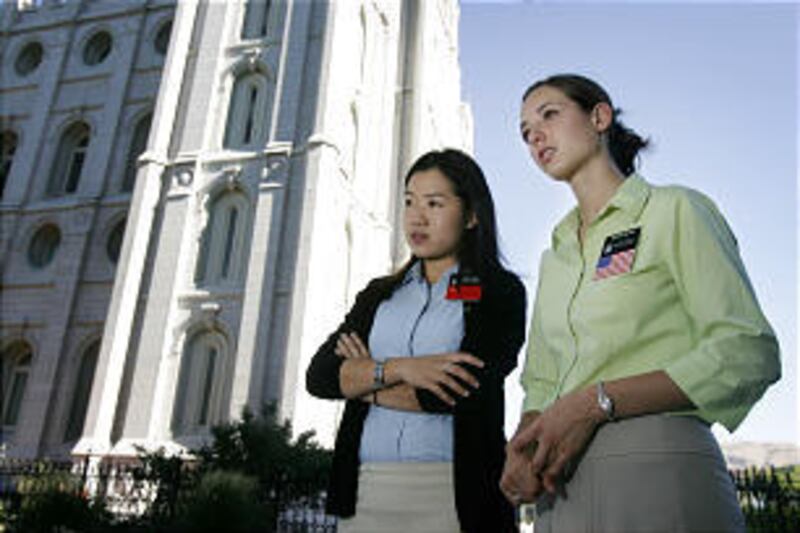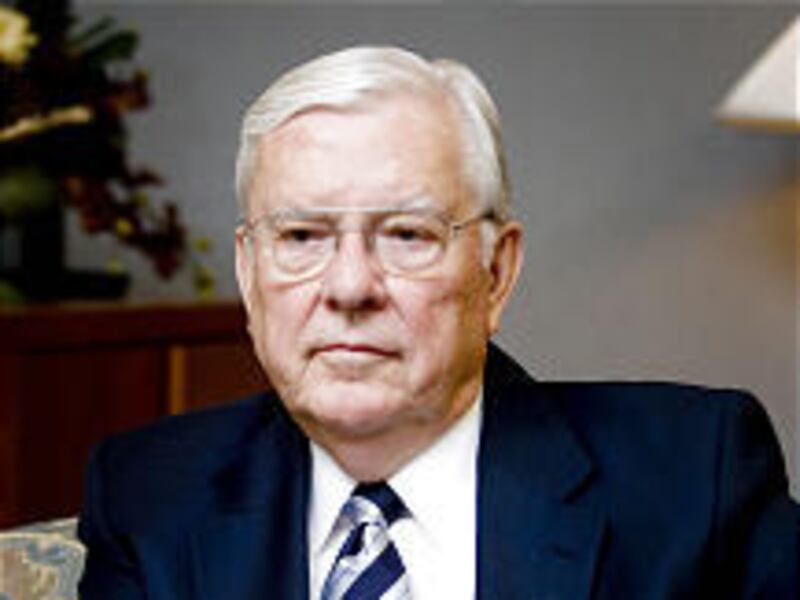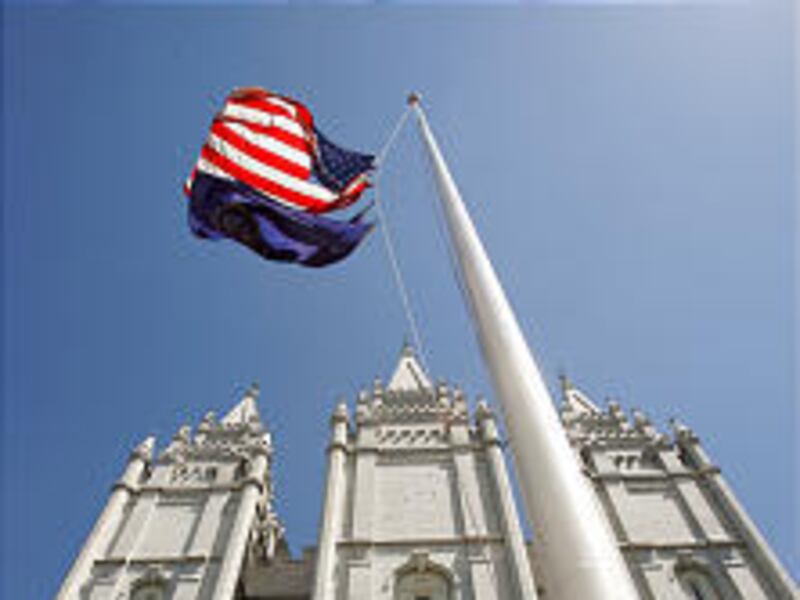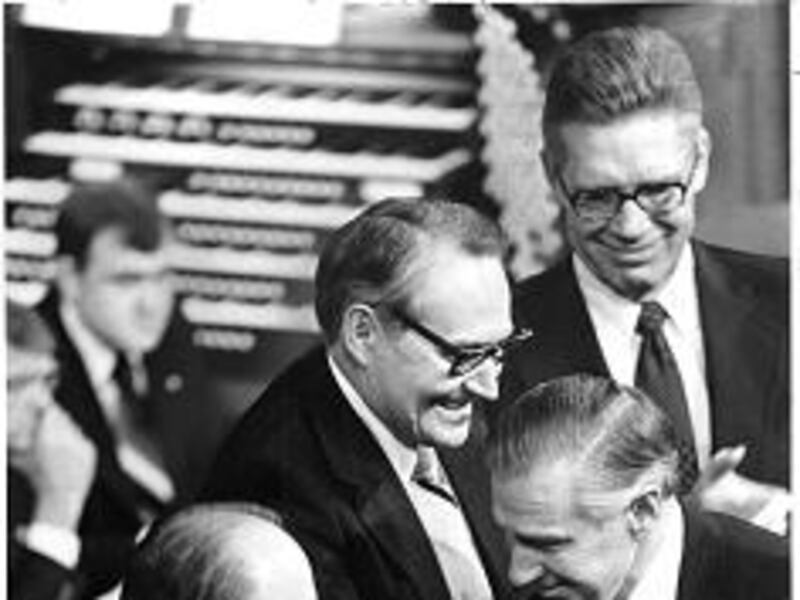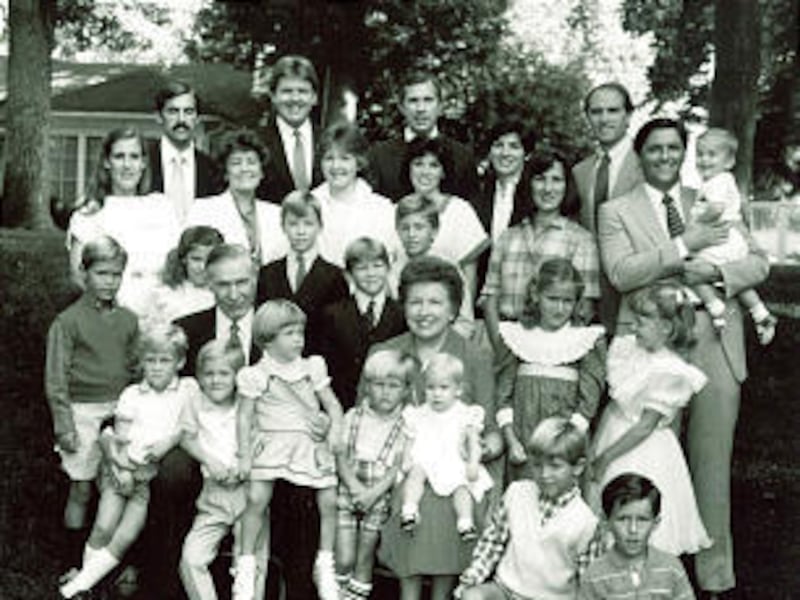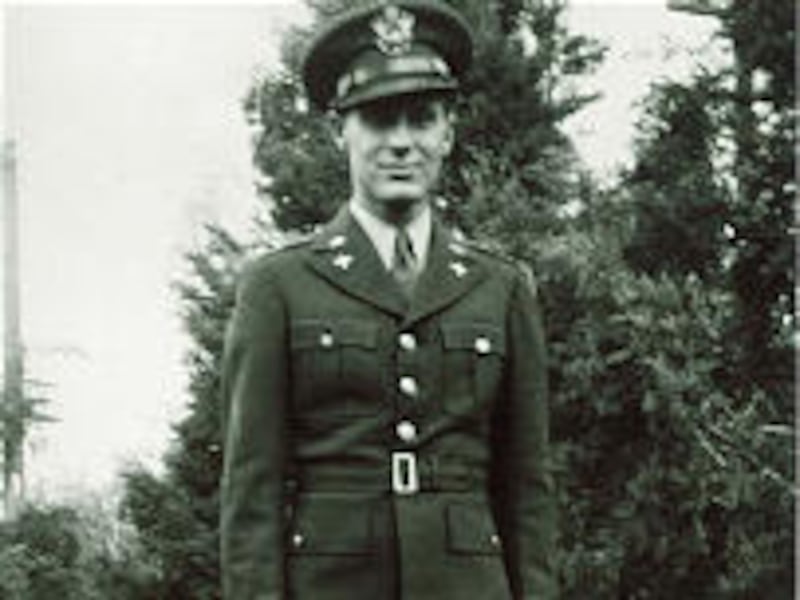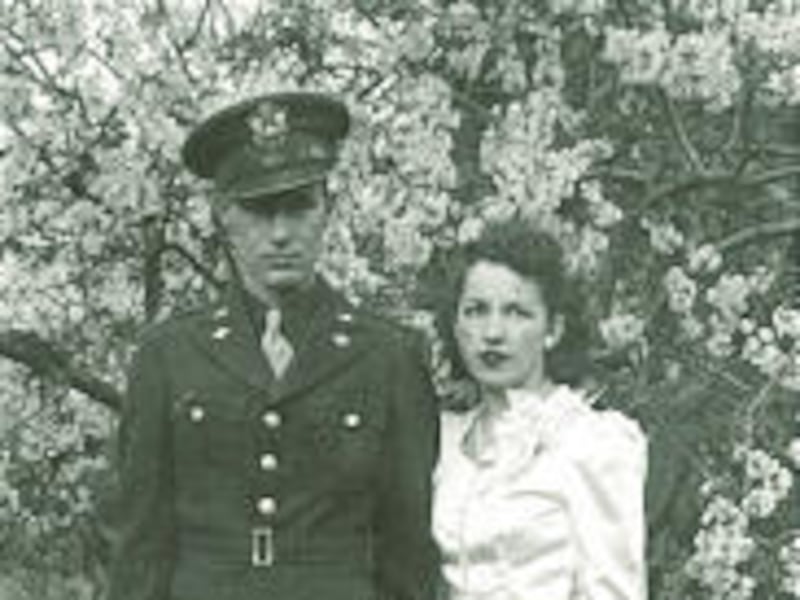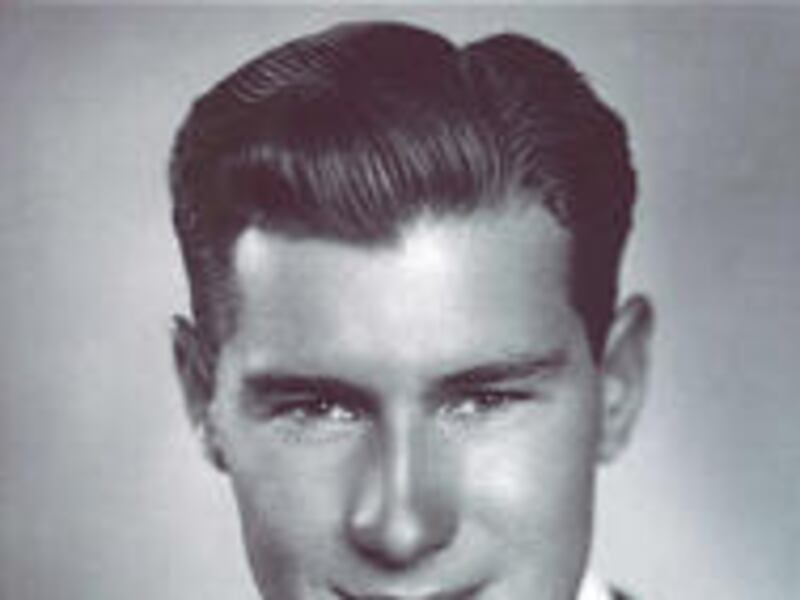President James Esdras Faust, 87, second counselor in the First Presidency of The Church of Jesus Christ of Latter-day Saints, was remembered Friday by colleagues, politicians, fellow attorneys and religious leaders as a man of wisdom, love and integrity who managed to make both his family and his church the top priorities in his life.
A general authority for nearly 35 years, he died of "causes incident to age" at 12:20 a.m. Friday, Aug. 10, 2007, surrounded by his family at home. Funeral services are scheduled Tuesday at noon in the Salt Lake Tabernacle, and a private burial will follow at the Holladay Memorial Park Cemetery. No public viewing will be held, but condolences can be e-mailed to condolences@ldschurch.org.
President Faust was seen in public most recently at a Pioneer Day commemorative concert in the Conference Center on July 20, and before that at the June dedication ceremonies for the new Gordon B. Hinckley Alumni and Visitors Center at Brigham Young University.
President Faust was known as a consummate church leader and political thinker, and his leadership and vision quietly helped forward a variety of LDS Church initiatives, including opposition in the 1980s to parimutuel betting in Utah, construction of the BYU Jerusalem Center, improved public relations and media interface, relationships with Chinese officials and instigation of the LDS Church's now-familiar logo emphasizing Jesus Christ.
But it was his love for his wife, Ruth, and their family that held sway in his heart. Following his calling to the First Presidency, he and Sister Faust called their family together so "I could explain to them that my first responsibility was as a husband, father and grandfather," President Faust said, according to his biography. "I reviewed how all of us would have to conduct ourselves better and be more representative of what we ought to be."
Such sentiments were expressions of what President Faust always sought to be, both in public and private, according to fellow LDS apostles.
Elder M. Russell Ballard, a member of the church's Quorum of the Twelve, has known President Faust for more than half a century. He told the Deseret Morning News on Friday that, in his judgment, "there is no better example of manhood, church leadership and fatherhood."
President Faust's early legal experience as an attorney with Fabian & Clendenin, and his service as a Democratic representative in the Utah Legislature, "helped him to understand how important it was to be sure the facts were all being considered" in making decisions, Elder Ballard said. Those qualities were paired with a "love and deep concern for all our Heavenly Father's children" as he shared his witness of Jesus Christ with people throughout the world.
The growth of the LDS Church in Brazil — which is now home to nearly 1 million Latter-day Saints — was especially pleasing to him, as he was one of the first missionaries to serve there, Elder Ballard said.
"Any time he had the opportunity to be in Brazil, that's when he was the happiest." Whenever discussions about developments there would come up, "we would see a smile. ... He spent a lot of time there and could see the needs of the worldwide church. Consequently, he had great compassion."
In 1998, when he attended the groundbreaking ceremony for the Porto Alegre Brazil Temple, he was made an honorary citizen of Sao Paulo in recognition of his lifelong ties to the city and the nation, putting him in company with only two other men — Pope John Paul II and the Dalai Lama. It took some arm-twisting from fellow church leaders to get him to accept it after they told him by doing so he may bring goodwill to the church itself.
As an Air Force veteran of World War II, President Faust "loved America, the state of Utah and Salt Lake City," Elder Ballard said. Looking beyond partisan politics, President Faust was always examining issues and events "for what was right and what needed to be done to see that we were working for the benefit and blessing of the people."
He was interested in "who people were, what they stood for and what values they would contribute to the nation and the community." In that spirit, "one of the great hallmarks of his life was service," Elder Ballard said. "He served his family, his nation, his community. ... To my knowledge, he did everything he was ever asked to do."
Seen by church members as quiet and unassuming, President Faust was "not always occupying the conversation" among his colleagues, "but when he spoke, you better be listening. He understood and was able to evaluate" readily the issues at hand and "how it would bless the lives of our Heavenly Father's children," Elder Ballard said.
He taught by example as he traveled with his colleagues to conferences, enriching both audiences and his traveling partners. "He was so wise and so gentle but so instructive in his capacity to lead and teach. ... I count it a great privilege to have known him. We extend our love and sympathy to (his wife) Ruth and his children and grandchildren, and to all the members of the church with the loss of our dear friend and associate."
Stories about him from colleagues and family members reflect a man comfortable with himself who sought to help, comfort and enrich others.
Marie Hafen, wife of Elder Bruce Hafen, shared a story her husband told her about the most recent general authority training meeting in April, when President Faust told the new leaders, "I have just seen a brand new grandchild. I wonder if I will live long enough to bear my testimony to her, that she will remember."
He said he may not live that long, but he could continue telling her parents.
"He wanted the new general authorities to think about their personal relationships with their posterity, telling them, 'We won't be remembered so much for our administrative contributions. Our children and grandchildren will be the ones who will remember us."'
In his biography, "In the Strength of the Lord: The Life and Teachings of James E. Faust," author James Bell chronicles several examples of a hardworking servant who was often quiet but also was unafraid to let his voice be heard about what was most important. Determined to treat others with kindness and reflect the love of Christ, those expressions happened first and foremost at home.
Elder Jeffrey R. Holland traveled often with President Faust during the years they were negotiating for construction of the BYU Jerusalem Center, and in the book offered firsthand observations of the tenderness he had for his wife and family.
"I'm sure he has only been able to do what he has done because of the unqualified, uncompromised, unlimited adoration and support and love and loyalty of his wife; and she has had exactly the same kind of support from him. I can't imagine that this was just handed to them from on high. I think that kind of relationship and romance has to be worked at and earned."
Granddaughter Nicole recalled his reaction at Christmastime 1994, when the family gathered to watch President Faust open a portrait of his wife they had urged her to have taken as a gift for his office. As he unwrapped it "he pumped his fist in the air as he let out a Portuguese expression meaning 'wonderful!' Then family members became absolutely silent as he continued to look at the picture, and then he began to shake as tears rolled down his cheeks. He was so touched he couldn't speak."
Son Marcus and his wife, Susan, told of shopping at a department store for a new lamp to go in their parents' condominium. When she described the two lamps, one of which was twice as expensive as the other, Sister Faust wanted to be conservative and opted for the less expensive one.
"But Dad said, 'Now Susan, we don't buy many lamps, and the price doesn't matter.' If we had been buying something for him, price certainly would have mattered, but because the lamp was for his Ruthy, it didn't."
Known most widely for his service in the Quorum of the Twelve and the First Presidency of the LDS Church, President Faust was set apart as second counselor to President Gordon B. Hinckley on March 12, 1995, and served with him and President Thomas S. Monson for nearly 12 1/2 years. He was ordained an apostle on Oct. 1, 1978, at the age of 58 and served in the Quorum of the Twelve for 16 years.
During the June building dedication ceremonies at BYU, President Faust said it had been "a tremendous blessing to serve with (President Hinckley) and Thomas S. Monson and see quite literally the Lord working through a prophet."
In his final general conference address on April 1, 2007, he extolled the healing power of forgiveness. "Let us remember that we need to forgive to be forgiven," he said. "With all my heart and soul, I believe in the healing power that can come to us as we follow the counsel of the Savior 'to forgive all men."'
A month later, he told several thousand young people gathered in the newly renovated Salt Lake Tabernacle that obeying God's commandments provides the kind of real self-esteem that escapes those who idolize fame, wealth or worldly success.
Delivering his remarks from a seated position, he used his own physical limitations to advocate humility. "I'm not talking about putting on sackcloth and ashes, but that (humility) which comes from inner strength and peace." Such strength "allows us to live with our own physical and mental defects without complaint," often providing the humility needed to be teachable, he said.
That humility became legendary among those closest to him.
His son, Marcus, talked in his father's biography about going with him to the Washington, D.C., temple to participate in a temple session. When President Faust presented his recommend for admission — a special one used by general authorities — the temple worker didn't recognize him or the recommend and denied him access. "Rather than embarrassing the man by telling him who he was, Dad politely excused himself and we all left."
Another time, a local reporter misconstrued a remark President Faust had made about a controversial issue. When the publisher was informed of the error, he called to apologize and asked for a copy of the audio tape that was made of the event. President Faust said he would provide one on condition that the reporter be dealt with kindly.
Concern for others often surfaced in chance meetings. When a group of students from Bountiful recognized him while he was enjoying a hot dog with his sons during a rare vacation in France, he was embarrassed to be eating in front of them and bought hot dogs for everyone, his biographer wrote.
On Friday, some wondered not how to measure him, but to measure up in terms of personal concern and impact.
President Boyd K. Packer of the Quorum of the Twelve recalled in the book the sense of loss within that quorum when President Faust moved to the First Presidency 12 years ago — likely a partial reflection of what his colleagues, family and church members now feel with his passing: "Today we've lost two men. We've lost James, and we've lost Esdras."
Contributing: Dennis Romboy
E-mail: carrie@desnews.com

